In April 2013, Jason Collins and I collaborated on his deeply personal essay for Sports Illustrated in which he became the first active male athlete in any of the four major American pro leagues—NBA, NFL, MLB and NHL—to announce he is gay.
It was hoped the NBA center’s declaration would encourage other gay athletes to go public. But 10 years later only one other active player in those leagues, Tampa Bay Buccaneers linebacker Carl Nassib, has come out. He did so while playing for the Las Vegas Raiders in ’21. By disclosing his orientation, Collins, then a 34-year-old free agent, breached one of the last barriers in the locker room, an ultra-masculine preserve where being gay is often equated with femininity, and femininity with weakness.
The response to Collins’s announcement was overwhelmingly positive. It was hailed as a milestone in civil rights. “A lot of young people out there who are gay or lesbian, who are struggling with these issues, to see a role model who’s unafraid, I think it’s a great thing,” said President Barack Obama. Others were not so accepting. Basketball analyst Chris Broussard—a fundamentalist Christian—said on ESPN that living publicly as a gay man was a sin equivalent to adultery and premarital sex, and that Collins was “walking in open rebellion to God and to Jesus Christ.”
Those contrasting reactions foreshadowed the polar views toward gender fluidity now playing out in courtrooms and state legislatures, and on courts and fields, across the country. In the decade since Collins dropped his bombshell, he has embraced his role as a symbolic figure for the path toward enlightenment of pro sports.
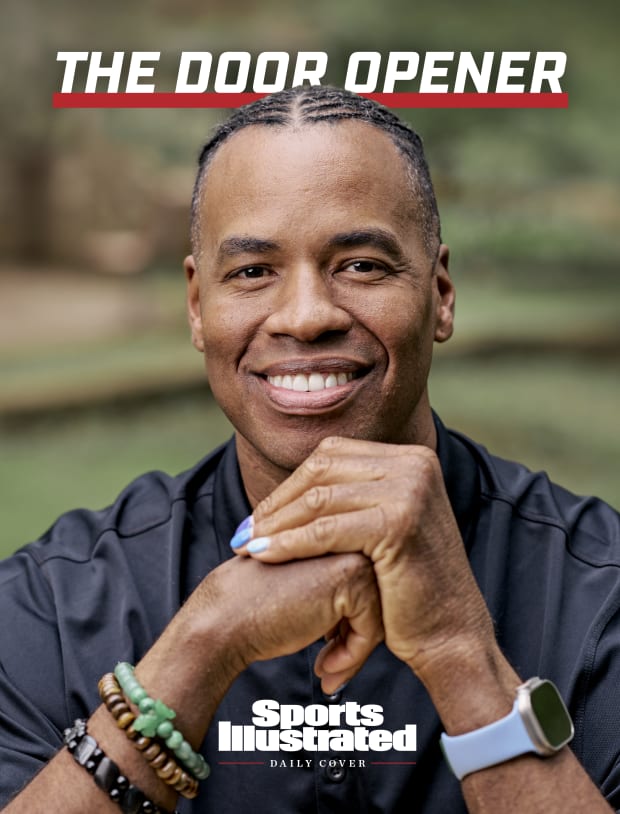
Darren Carroll/Sports Illustrated
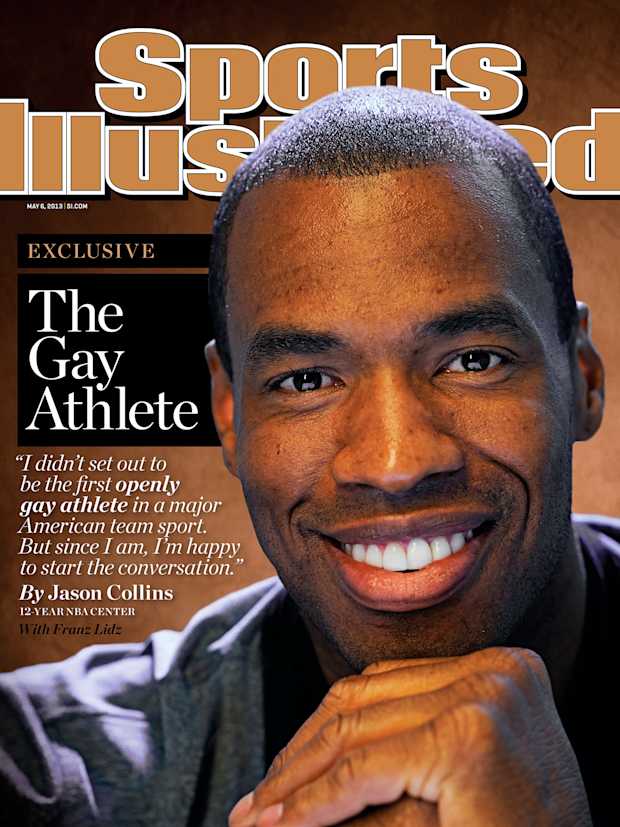
Kwaku Alston/Sports Illustrated
On Feb. 23, 2014, after months of waiting for a team to call, he signed a contract with the Brooklyn Nets. Collins had spent half his career with the Nets when they played in New Jersey, where he was a teammate of Jason Kidd, who by ’14 was the team’s coach. A few hours later, to cheering and applause, Collins took the floor in the second quarter of a road game against the Lakers.
From the next game to the end of that season, he wore No. 98, as he had the previous year. But now the world knew why: It was a tribute to Matthew Shepard, a University of Wyoming student who was tortured and murdered in 1998 in a notorious anti-gay hate crime. Besides championing a raft of LGBTQ causes and contracting long COVID at the start of the pandemic (“the weird side effect is that one of my toes swells enormously”), Collins has found happiness in a nine-year relationship with Brunson Green, a film producer best known for The Help. He shuttles between homes in Austin and Los Angeles, where we discussed what’s happened and not happened during the intervening years, and why.
Sports Illustrated: Just two months before you went public, on the eve of Super Bowl XLVII, Chris Culliver, a cornerback for the San Francisco 49ers, said a gay teammate would not be welcome in the locker room.
Jason Collins: There was a general sense that homosexuality was not discussed in the locker room.
SI: Yet you demonstrated that coming out would be met with widespread acceptance. Why has only one male pro followed your lead?
JC: I think it’s always going to be fear. Fear of rejection. Fear that people will look at you differently. Fear of the scrutiny that will come with the spotlight.
SI: So fear of the scrutiny that comes with the spotlight, and not fear of losing sponsorships, is what makes the gay athletes think that silence is their only option?
JC: I’m living proof that sponsorships are not at stake. Ten years later I’m still a Nike athlete.
SI: Do some of those closeted gay athletes hold back out of fear that a bigoted opponent might try to intentionally injure them?
JC: As professional athletes they should already know how to protect themselves on the court or the field or the ice. They’ll be fine, especially if their teammates have their backs. I mean, I’ve been hit by Shaq and recovered.
SI: Was coming out a relief?
JC: There’s a stress that you walk around with constantly when you’re in the closet. When I came out, it was like I’d ripped off a Band-Aid. There was so much support from fans and teammates, so many new friends that I made, and I thought, Why didn’t I do this sooner?
SI: Martina Navratilova and many women athletes were comfortably out of the closet during their careers, but male pro sports seemed to be one of the great holdouts. Though the NBA has long prided itself on being as socially progressive as it is diverse, 10 years after you went public, you’re still an anomaly.
JC: The movement for gay pro athletes coming forward and speaking their truth and living authentically has been led by women. I couldn’t have done what I did without Martina and Billie Jean King, and the campaign continues to be led by women. Sue Bird, Brittney Griner, Abby Wambach, Megan Rapinoe … the list goes on and on. We do need the male gay athletes to step forward when they’re ready.
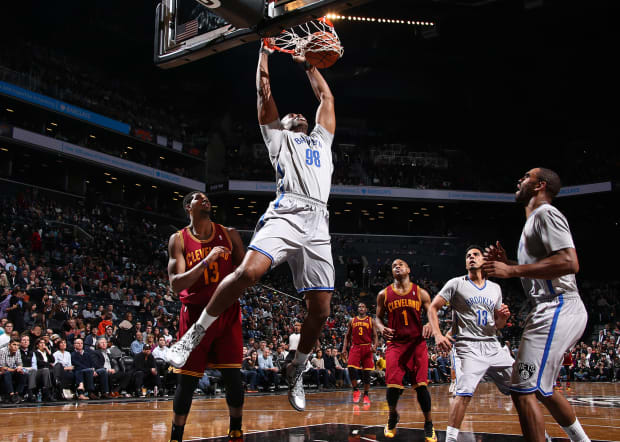
Nathaniel S. Butler/NBAE/Getty Images
SI: But they are still not “out” there.
JC: It’s funny. Just before I made my announcement there was a rumor that a group of four active NFL players were about to come out. I was like, O.K., that’s cool. But the coming out party never happened. After making my announcement, I was put in touch with an online community of gay athletes, a kind of brotherhood that supports each other.
SI: What advice do you give closeted athletes?
JC: I listen and offer support. Gay athletes are sometimes deeply conflicted. They keep trying to believe the lie that they’re straight, though deep down they know they are gay. I don’t want to tell athletes what to do, because everyone’s got their own path.
SI: When the Sports Illustrated essay was posted online, Kobe Bryant used his Twitter feed to advise you not to “suffocate who u r because of the ignorance of others.” At what age did you start feeling confused about who you were?
JC: I was in junior high school, but I didn’t want to acknowledge that I might be gay. Interestingly, my uncle Mark, who’s gay, connected the dots when I was 5.
SI: What tipped him off?
JC: I was watching an episode of Family Feud that pitted actors against actresses, and I kept wanting the actors to remain on-screen and kept getting upset when the camera panned to the actresses.
SI: That’s some mighty sensitive gaydar your uncle has.
JC: Now that I’m older and have family and friends with children, I try to set an example for kids and encourage parents not to censor or censure their children’s identities.
SI: Some parents worry that their boys might be gay and potentially headed down a road that could make their lives more difficult and possibly more perilous. Others refuse to even consider the possibility that their son is not straight. What kind of advice would you offer those parents?
JC: At that age, you should let a boy be who he is and let him know that you love him for that. What’s most important is that he has your approval and unconditional love. By trying to shield him from bullying and hate, you might convey the message that you don’t think he makes good choices and that he needs to hide his real self. He needs a sanctuary in which he can be himself, and that should be with his parents. It’s said that internalizing feelings often leads to shame, isolation and loneliness, which in turn can lead to hopelessness, even suicide.
SI: What do you make of proposals to block schools and state colleges from having programs on diversity, equity and inclusion? Tennessee has attracted national attention for its anti-trans legislation and its ban of drag shows in certain public spaces. In Florida, proposed legislation would eliminate college majors in gender studies and extend a ban on teaching about gender and sexuality—from third up to eighth grade.
JC: It’s sad and so unnecessary. Politicians are inserting themselves into situations that should be left to kids and parents and their doctors. Again, you have to speak out. I hope common sense wins out eventually.
SI: In 2013 it seemed that if you could just humanize gay people to homophobes, maybe you could change their minds. In 2023 people are so polarized and entrenched that at times our divisions appear unbridgeable. How do you overcome that?
JC: For homophobes to change, they must know someone gay—a friend or a relative—and that person needs to speak up and act as an advocate. If the homophobes are coming from ignorance, that’s one thing. But if they’re coming from hatred, you need to put yourself in a safe space before you start engaging with them. In a one-on-one situation, I think I could make a persuasive case. But within a group setting, a mob mentality takes over, which is fear of the unknown, fear of the other.
SI: Initially you had close family members who resisted the idea of you coming out.
JC: They were from an older generation and didn’t want it to be public. I’ve encountered situations in which someone is out privately but not publicly. I couldn’t be in that situation. It’s not me. There are other people who live that life, and that’s their choice. But I think there’s an opportunity that they’re missing to inspire others.
SI: How lonely were you as a closeted NBA bachelor?
JC: Very lonely. For a couple years I never went on a date. I’d stay home watching TV with my German shepherd, Shadow, and, when people asked what I was doing, I’d make something up.
SI: You had dated the former WNBA player Carolyn Moos, a classmate of yours at Stanford, for eight years, and even got engaged. You called off the engagement in 2009. How do you look back on that time?
JC: I’m still in contact with her. I try not to look back on life with regrets. Now I understand that this was part of my path. As naive as it sounds, I was under the illusion that I would find the right girl who would make all the confused feelings go away. It doesn’t work like that.
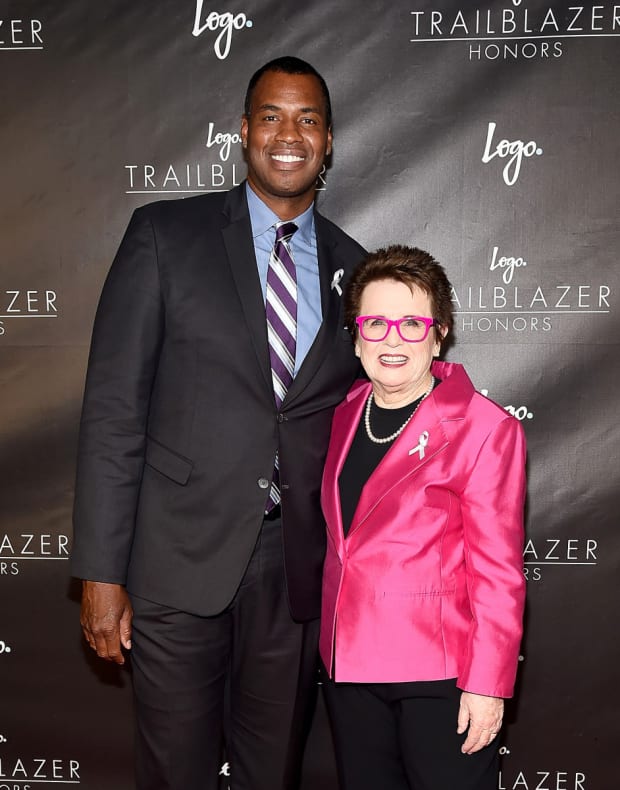
Gary Gershoff/Getty Images for Logo
SI: What was it like to enter the gay dating scene?
JC: I quickly got into a relationship that only lasted a few months. Most people have crushes as teenagers. Unfortunately, I didn’t experience that until my mid-30s. Going through a breakup, particularly a tough one, makes you more empathetic. You understand more about the human condition. I guess that’s why there are so many sad songs that become No. 1 hits. I made a whole playlist of them.
SI: How did you and Brunson meet?
JC: At a housewarming party a couple of months after the SI story appeared. I was dating another guy at the time. I didn’t see Brunson again until we ran into each other at a party three months later. By that point, I was single again. Brunson left for Europe the following day, and, while he was overseas, I asked everyone I knew in L.A., “Have you heard of this guy?”
SI: Just doing your due diligence.
JC: Yeah, a background check. Brunson grew up in Mississippi and, like me, came out when he was 34. He’s 11 years older.
SI: As an interracial couple have you faced any pushback?
JC: I can’t say I’ve noticed explicit racism or homophobia when we’re together. The bigotry I’ve faced involved being Black in the South, not being gay. Both instances of racism happened on golf courses in Atlanta. The first time I was solo at the Chastain Park Golf Course. I caught the group of three men, all white, ahead of me and I couldn’t play through. So I asked if I could join them and they said sure. Everything was fine until the 9th green, when one of them missed a putt and said the n-word.
SI: At you?
JC: No, he just said the n-word like he’d utter any other expletive for missing a putt. I thought, I didn’t just hear the n-word, did I?
SI: How did his playing partners react?
JC: One sat in his cart with his head down. The other guy just stood there with a look like, Oh, crap, what’s gonna happen now?
SI: What did happen?
JC: The guy who said it casually walked up to the hole and tapped in his putt. Thank God it was the 9th green, because I literally picked up my ball mark and walked off. If I had said something, things could have escalated quickly, especially with each of us holding clubs. And the headline wouldn’t be “White golfer starts fight with racial slur.” It would be “NBA center goes nuts on golf course.”
SI: Did you tell your teammates?
JC: Yeah. I remember Josh Smith saying that he would have handled the situation very differently.
SI: More like a UFC cage fighter?
JC: Pretty much.
SI: Do you remember your golf score that day?
JC: No, I only played nine. But I’m pretty sure that I was on my way to breaking 100, which is always my goal.
SI: When you got drafted into the NBA in 2001, the locker room culture was one of almost toxic masculinity.
JC: I’d hear a lot of mean-spirited, homophobic comments, and I’d also hear comments that were just dumb. A lot of the language that’s used to put others down in the sports world is either sexist or homophobic.
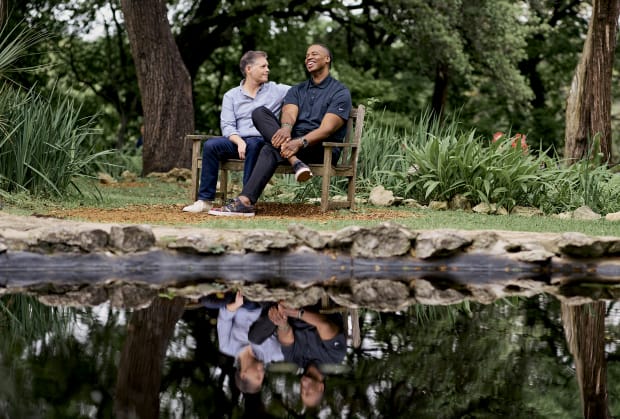
Darren Carroll/Sports Illustrated
SI: Trash talk?
JC: Trash talk. These are the words and language that, unfortunately, are picked up on playgrounds and taught by coaches who are repeating a cycle of words and language that they had used. So there’s a lot of unlearning to do. Fortunately, there’s usually a disconnect between those words and what athletes actually believe. After I came out, some of those trash talkers became my biggest supporters. I can’t emphasize enough to all athletes: You never know who’s listening to you. It could be a coach who has a lesbian partner or gay son. It could be a trainer or a team owner with a son or a grandchild who’s a member of an LGBTQ community. The question is, Where do you truly stand?
SI: In 2013, after you signed with the Nets, did you hear much heckling from the stands?
JC: Not from the stands, but once a rival player, a knucklehead whom I’d rather not name, said something while I was standing under the basket before a free throw.
SI: Do you recall what the knucklehead said?
JC: Something like, “You don’t belong back in the NBA.” It wasn’t an epithet, but the message was clear.
SI: Did you confront him?
JC: No, he’s not someone—how to put it politely?—that you would waste your time on. One of my teammates overheard him and wanted to speak up for me, but I waved him off. I did appreciate that the teammate had my back, but then all of my teammates had my back.
SI: Gallup estimates that more than 7% of the U.S. adult population is lesbian, gay, bisexual or transgender, and that about 3% of American men are gay. This past season there were nearly 500 players on NBA rosters. Statistically, you’d figure around 15 players are currently in the closet. Do you know of any who are weighing whether to come out?
JC: No. But then it’s not just players. There are others in powerful positions within the NBA and other major sports. Owners, general managers, coaches, trainers who are reluctant to reveal their sexuality. It’s reassuring to know that when that next person does step forward, he will not go through this alone. There’s a great support system in place. I’m so proud of my twin brother, Jarron, a New Orleans Pelicans assistant coach, for being a true ally and standing up for me and my community.
SI: What do you tell wavering male athletes?
JC: I try to allay their fears and tell them that it’ll be O.K. For a while, my No. 98 Nets jersey was the top seller at the NBA Store and its website. I still see people wearing replicas at games and gay pride marches. Shortly after I retired, the Smithsonian asked me to donate a game jersey to its permanent collection. I did, happily. It doesn’t need to sit on a shelf of my bedroom closet.
SI: So even your jersey is out of the closet.
JC: For sure.
SI: Do fans approach you differently these days?
JC: Not long ago I was in an airport hustling to make a connection. A flight attendant sprinted out and said, “Jason, now that we’re comfortably out of the plane, I want to say, Thank you.” That was really cool. Another time a firefighter at the pride parade in Washington, D.C., related how my story had helped his relationship with his mom, who loved sports but not him being gay. When she heard about this gay NBA player named Jason Collins, she reconsidered. So, in my small way I helped ignite a conversation between a son and his estranged mom. That’s part of the beauty of sports.
SI: What’s left to do?
JC: What’s left is to get to the point where the coming out of a male athlete is no different than their female counterparts. When two-time WNBA MVP Elena Della Donne announced that she was gay before the 2016 Olympics, everybody was like, Good for you, Elena, now go win a gold medal. That’s where we need to be.
SI: Are you apprehensive or hopeful about the future?
JC: I have hope because I observe and talk to the next generation, and they’re good kids. When I hold basketball clinics, most of them will know my story. They’ll see my fingernail polish and say, “Oh, you’re different; you’re cool.” Back when I was a kid attending basketball camps, I thought, “Am I the only one?” As adults we need to encourage youngsters and not suppress them, because suppression only leads to anger and resentment.
SI: You’ve had a lasting impact on the NBA’s social conscience and perhaps moved us closer to a future where an athlete’s orientation won’t matter. Do you see yourself as having cracked the ceiling or opened the door?
JC: Ten years ago, I would have said “crack the ceiling” because I kept thinking of a line from Moneyball that goes something like: “I know you are taking it in the teeth, but the first guy through the wall always gets bloody.” I was that first guy through the wall. I was willing to go through whatever I had to in order to speak my truth.







